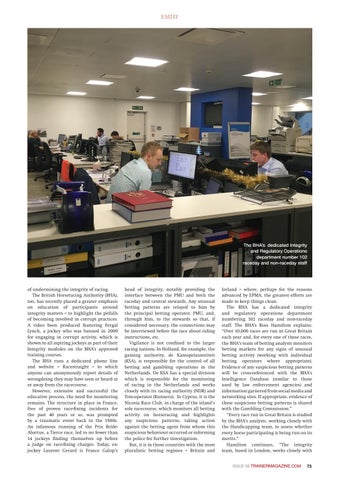EMHF
The BHA’s dedicated Integrity and Regulatory Operations department number 102 raceday and non-raceday staff
of undermining the integrity of racing. The British Horseracing Authority (BHA), too, has recently placed a greater emphasis on education of participants around integrity matters – to highlight the pitfalls of becoming involved in corrupt practices. A video been produced featuring Fergal Lynch, a jockey who was banned in 2009 for engaging in corrupt activity, which is shown to all aspiring jockeys as part of their Integrity modules on the BHA’s approved training courses. The BHA runs a dedicated phone line and website – Racestraight – to which anyone can anonymously report details of wrongdoing they may have seen or heard at or away from the racecourse. However, extensive and successful the educative process, the need for monitoring remains. The structure in place in France, free of proven race-fixing incidents for the past 40 years or so, was prompted by a traumatic event back in the 1980s. An infamous running of the Prix BrideAbattue, a Tierce race, led to no fewer than 14 jockeys finding themselves up before a judge on race-fixing charges. Today, exjockey Laurent Gerard is France Galop’s
head of integrity, notably providing the interface between the PMU and both the raceday and central stewards. Any unusual betting patterns are relayed to him by the principal betting operator, PMU, and, through him, to the stewards so that, if considered necessary, the connections may be interviewed before the race about riding instructions, etc. Vigilance is not confined to the larger racing nations. In Holland, for example, the gaming authority, de Kansspelautoriteit (KSA), is responsible for the control of all betting and gambling operations in the Netherlands. De KSA has a special division which is responsible for the monitoring of racing in the Netherlands and works closely with its racing authority (NDR) and Tote-operator (Runnerz). In Cyprus, it is the Nicosia Race Club, in charge of the island’s sole racecourse, which monitors all betting activity on horseracing and highlights any suspicious patterns, taking action against the betting agent from whom this suspicious behaviour occurred or informing the police for further investigation. But, it is in those countries with the most pluralistic betting regimes – Britain and
Ireland – where, perhaps for the reasons advanced by EPMA, the greatest efforts are made to keep things clean. The BHA has a dedicated integrity and regulatory operations department numbering 102 raceday and non-raceday staff. The BHA’s Ross Hamilton explains: “Over 10,000 races are run in Great Britain each year and, for every one of these races, the BHA’s team of betting analysts monitors betting markets for any signs of unusual betting activity (working with individual betting operators where appropriate). Evidence of any suspicious betting patterns will be cross-referenced with the BHA’s Intelligence Database (similar to those used by law enforcement agencies) and information garnered from social media and networking sites. If appropriate, evidence of these suspicious betting patterns is shared with the Gambling Commission.” “Every race run in Great Britain is studied by the BHA’s analysts, working closely with the Handicapping team, to assess whether every horse participating is being run on its merits.” Hamilton continues, “The integrity team, based in London, works closely with ISSUE 56 TRAINERMAGAZINE.COM
EUROPEAN TRAINER ISSUE 56 EMHF.indd 53
73
22/12/2016 10:23
